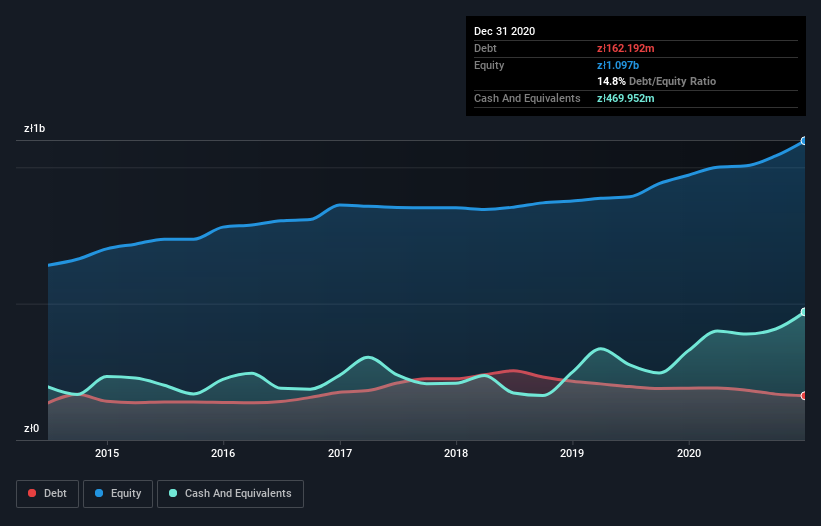Legendary fund manager Li Lu (who Charlie Munger backed) once said, 'The biggest investment risk is not the volatility of prices, but whether you will suffer a permanent loss of capital.' So it might be obvious that you need to consider debt, when you think about how risky any given stock is, because too much debt can sink a company. Importantly, Comarch S.A. (WSE:CMR) does carry debt. But is this debt a concern to shareholders?
Why Does Debt Bring Risk?
Generally speaking, debt only becomes a real problem when a company can't easily pay it off, either by raising capital or with its own cash flow. In the worst case scenario, a company can go bankrupt if it cannot pay its creditors. However, a more usual (but still expensive) situation is where a company must dilute shareholders at a cheap share price simply to get debt under control. Of course, the upside of debt is that it often represents cheap capital, especially when it replaces dilution in a company with the ability to reinvest at high rates of return. When we think about a company's use of debt, we first look at cash and debt together.
Check out our latest analysis for Comarch
How Much Debt Does Comarch Carry?
The image below, which you can click on for greater detail, shows that Comarch had debt of zł162.2m at the end of December 2020, a reduction from zł189.7m over a year. But on the other hand it also has zł470.0m in cash, leading to a zł307.8m net cash position.

How Healthy Is Comarch's Balance Sheet?
The latest balance sheet data shows that Comarch had liabilities of zł645.5m due within a year, and liabilities of zł252.2m falling due after that. Offsetting these obligations, it had cash of zł470.0m as well as receivables valued at zł581.9m due within 12 months. So it actually has zł154.1m more liquid assets than total liabilities.
This surplus suggests that Comarch has a conservative balance sheet, and could probably eliminate its debt without much difficulty. Simply put, the fact that Comarch has more cash than debt is arguably a good indication that it can manage its debt safely.
In addition to that, we're happy to report that Comarch has boosted its EBIT by 38%, thus reducing the spectre of future debt repayments. The balance sheet is clearly the area to focus on when you are analysing debt. But it is future earnings, more than anything, that will determine Comarch's ability to maintain a healthy balance sheet going forward. So if you want to see what the professionals think, you might find this free report on analyst profit forecasts to be interesting.
Finally, a company can only pay off debt with cold hard cash, not accounting profits. Comarch may have net cash on the balance sheet, but it is still interesting to look at how well the business converts its earnings before interest and tax (EBIT) to free cash flow, because that will influence both its need for, and its capacity to manage debt. Over the last three years, Comarch recorded free cash flow worth a fulsome 95% of its EBIT, which is stronger than we'd usually expect. That puts it in a very strong position to pay down debt.
Summing up
While we empathize with investors who find debt concerning, you should keep in mind that Comarch has net cash of zł307.8m, as well as more liquid assets than liabilities. The cherry on top was that in converted 95% of that EBIT to free cash flow, bringing in zł202m. So we don't think Comarch's use of debt is risky. Over time, share prices tend to follow earnings per share, so if you're interested in Comarch, you may well want to click here to check an interactive graph of its earnings per share history.
If, after all that, you're more interested in a fast growing company with a rock-solid balance sheet, then check out our list of net cash growth stocks without delay.
If you’re looking to trade Comarch, open an account with the lowest-cost* platform trusted by professionals, Interactive Brokers. Their clients from over 200 countries and territories trade stocks, options, futures, forex, bonds and funds worldwide from a single integrated account. Promoted
New: AI Stock Screener & Alerts
Our new AI Stock Screener scans the market every day to uncover opportunities.
• Dividend Powerhouses (3%+ Yield)
• Undervalued Small Caps with Insider Buying
• High growth Tech and AI Companies
Or build your own from over 50 metrics.
This article by Simply Wall St is general in nature. It does not constitute a recommendation to buy or sell any stock, and does not take account of your objectives, or your financial situation. We aim to bring you long-term focused analysis driven by fundamental data. Note that our analysis may not factor in the latest price-sensitive company announcements or qualitative material. Simply Wall St has no position in any stocks mentioned.
*Interactive Brokers Rated Lowest Cost Broker by StockBrokers.com Annual Online Review 2020
Have feedback on this article? Concerned about the content? Get in touch with us directly. Alternatively, email editorial-team (at) simplywallst.com.
About WSE:CMR
Flawless balance sheet with reasonable growth potential.
Similar Companies
Market Insights
Community Narratives



